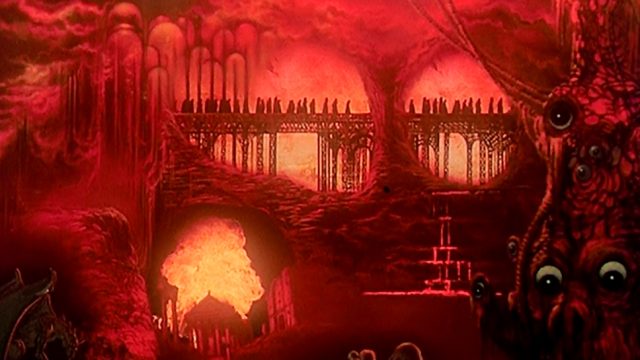Is this Disney’s most toxic live-action movie? Like, putting Song of the South in the “mixed” category? Honestly, no it is not. It has probably Disney’s most toxic live-action actor—is he better or worse than the voice of Gepetto, who would interrupt recording with pro-Nazi rhetoric? Or is that the point where we throw up our hands and declare it a race to the bottom? Still, the movie itself is weirdly heartwarming, if you can get over the twenty minutes or so of it prominently featuring a serial rapist. Which I am definitely not suggesting you should do. And I would like to emphasize that, for reasons, he got no money from my viewing of this film.
Max Devlin (Elliott Gould, of whom I know nothing bad off the top of my head) is a creep. He likes to blame everything that’s wrong with the apartment complex he ostensibly manages on “the owner,” but it’s quickly revealed that he is the owner. He insists that the bugs infesting an apartment are not cockroaches, they’re palmettos, which are harmless. (Looking up that he was wrong produced fascinating information about roaches that I’m not sharing with you.) And then an old blind lady (Helene Winston) who turns out to be an agent of Hell trips him in the street, and he’s killed.
He is met in Hell by the board, led by the Chairman (Reggie Nalder), and in particular “Barney Satin” (the rapist), who offers him a contract. He will bring three souls to replace his. Three with “fresh, unsullied innocence,” and that’s not creepy coming from that man at all. Anyway, he has a set length of time—I missed how long—to acquire these three people. One is Stella Summers (Julie Budd), a shy young woman who wants to be a singer. One is “Nerd” Nordlinger (David Knell), who dreams of motocross and will pick up the new nickname “Nerve.” And one is Toby Hart (Adam Rich), who wants a dad.
They’re all referred to as children the whole time. And I suppose Nerve can pass as a high school student; the actor was twenty, but a few years here or there don’t matter. Adam Rich was thirteen, and I think his character is ten. But Julie Budd was twenty-seven and didn’t look even a little like a kid. She looks good, and while her songs are extremely dated they also aren’t bad, but they keep referring to Max as corrupting kids, and . . . no. Toby’s a kid, but Max and Stella very much are not.
The movie makes it very clear that the three are not just pure and innocent but nice. After they sign their contracts, they stop being nice. Stella signs her contract and immediately gives a Grammy acceptance speech saying she did it all herself despite the fact that she literally cannot sing in front of people without Max’s magic. Toby immediately starts to hate Max, whom he had wanted as a dad specifically, above the unseen other guy dating his mom, Penny (Susan Anspach). Nerve is kind of a nonentity, honestly, and feels as much a way to get a bunch of extremely dated motocross scenes in the movie as anything else.
But let’s talk a minute about Stella. When we first meet her, she is hanging out with her Definitely Best Friend And Nothing More Heidi (Deborah Baltzell). Except when Heidi’s asked who she is by the head of A&R for the record company that immediately signs Stella, she declares herself to be Stella’s number one groupie. The word “groupie” was nearly fifteen years old at this point (in this context; there’s no mistaking Heidi for an RAF group captain), and the context was pretty clear. No one ever questions this, and Stella doesn’t end up with Nerve or anything at the end, and I honestly think Heidi is Stella’s girlfriend. Did screenwriter Mary Rodgers intend that? That, I can’t answer. But it’s definitely shown as a Bad Thing that Stella is seeing Heidi less and less as she’s more and more famous.
This has long been a controversial film. These days, it’s because of that Hugely Problematic Actor—whose wife didn’t want him to take the role, and my Gods wouldn’t it be nice if he’d listened to her. However, in its initial release, that wasn’t yet being discussed. It was, on the other hand, Faust, You Know, For Kids. Elliott Gould is trying to get at least one literal child to sell his immortal soul, and the kid’s just relieved that Max doesn’t want his two boxes of Red Hots. That is, let’s be real, some dark stuff. And this is before the days when Disney hid behind Touchstone or similar.
However, this is a surprisingly okay film. Oh, Jimmy Sangster, who wrote the original story as a Vincent Price vehicle for Hammer didn’t think so. Nor did the people who insist that Walt never would’ve allowed use of the word “Hell” despite the fact that Maleficent uses it in Sleeping Beauty, just for starters. And goodness knows you shouldn’t rush right out to track it down given [gestures vaguely at “Barney”], and of course it’s not on Disney+. But it’s not as awful a movie as you might assume given [gestures vaguely at entire movie]. I also now have the headcanon that Stella and Heidi lived happily ever after, hopefully with Stella as a songwriter, where she doesn’t have to deal with the same kind of pressures.
Sign a contract with Patreon or Ko-fi! I’m not asking for your soul, just a buck or two a month!

